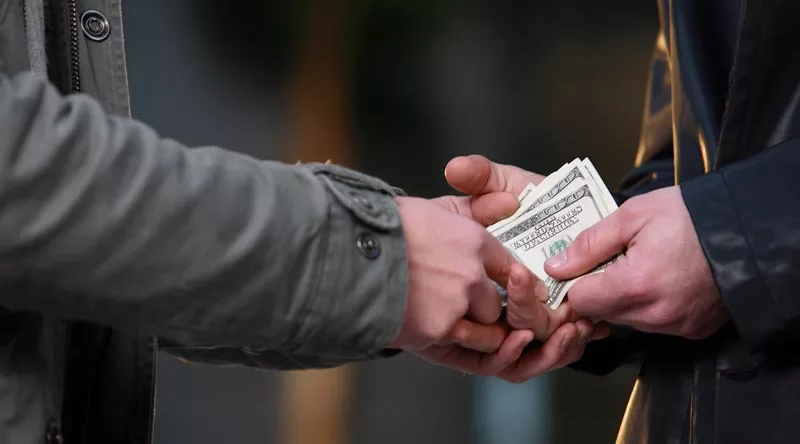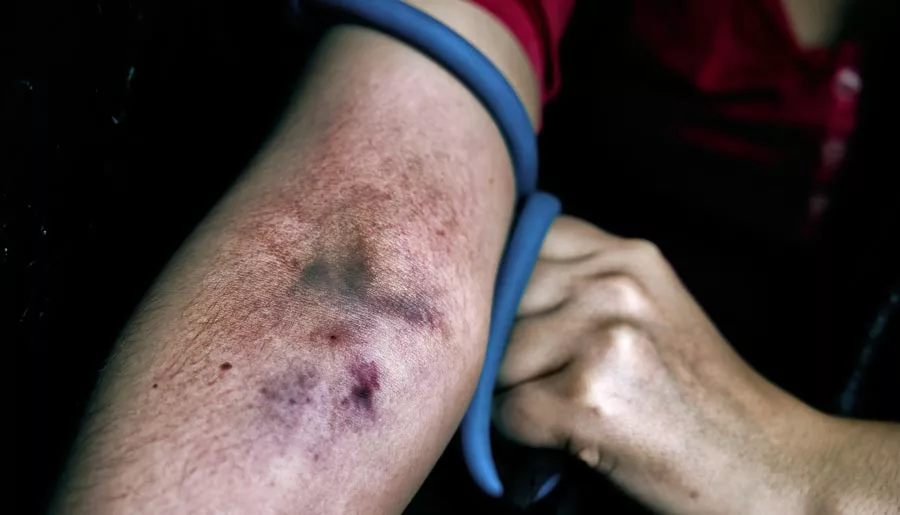Signs of Heroin Addiction in Friends and Family Members
Table of Contents
- Signs of Heroin Addiction in Friends and Family Members
- 1. Increased Need for Sleep
- 2. Lacking Hygiene
- 3. Catching them in Lies
- 4. Financial Strain
- 5. Treasured Items are Missing
- 6. Changing Social Circles
- 7. Strife at Home
- 8. Know Your Paraphernalia
- 9. Marks on Body
- 10. Missed Events or Appointments
- 11. Withdrawal
Addiction is an epidemic that afflicts over 7 million Americans every year. Some addictions seem to hold a greater stigma than others, making them even harder to diagnose then treat. In fact, an addiction to heroin, an opiate drug, carries an enormous stigma. This means that recognizing the signs of heroin addiction can be a tricky endeavor.
However, heroin abusers are people from every socioeconomic group. Worse, sufferers who currently have or have had an addiction to prescription painkillers in the past are more likely to start using heroin because it’s much cheaper to buy than those painkillers. In addition, users whose doctors refuse to extend painkiller prescriptions feel they have no other solution.
Do you think that someone you love is using heroin? Here are some key indicators the consider if you think it’s time to help them seek addiction treatment.
1. Increased Need for Sleep
Have you noticed that your family member or friend suddenly seems to nod off at inappropriate times?
Heroin is a drug called a “downer,” This means the user feels very mellow, calm, and sleepy. If your friend is suddenly nodding off during a meal, at work, or when they’re driving, it’s a key indicator of heroin addiction.
This effect is particularly alarming if the person is typically extroverted, outgoing, active, and talkative. It’s harder to spot in a person who is introverted, prefers solitude, or is very quiet by nature.
2. Lacking Hygiene
By our teenage years, we’ve established good daily hygiene habits. We may not always wear our finest outfits every day. But we know to shower or bathe and brush and floss as part of our hygiene routine.
However, a heroin user quickly begins to slip up in these daily routines. If it seems to you like your loved one has become lax about hygiene, that’s one of many possible signs of heroin addiction.
Some things you might notice would be as follows:
- Skips showering or bathing
- Stops brushing their teeth
- Don’t brush/comb their hair, suffer hair loss due to stress
- Wears the same clothes every day without washing them
- The face has taken on a slack or drooped appearance
When you ask them about this lack of hygiene, a common excuse is that they don’t feel well.
3. Catching them in Lies
You’ve noticed your friend is arriving at school or working late on a consistent basis. When you ask them about why they are late, they tell you blatant lies or stories that don’t make sense.
Heroin abusers are often embarrassed by their addiction. They cover up their runs to meet their dealers by lying about it. Some of the more obvious signs of heroin addiction can be concealed with distortions of the truth.
Common excuses that you’ll hear are the following:
- Running errands
- Visiting friends
- Working late
- Stayed to do homework
In addition to lying about their whereabouts, they often need to lie about items missing from their home. This is because they often pawn personal items of their own and family members to get the money for drugs. Missing items go hand-in-hand with living with a drug addict.
4. Financial Strain

A financial strain happens to virtually everyone from time to time. When finances get tight, people turn to the people they love and trust the most for help. Perhaps they borrow the cash to pay a forgotten utility bill, or they say they’re short on the monthly rent or mortgage.
When this behavior becomes suspicious is when the request to borrow money becomes a repetitive habit every month. With each passing month, there’s a new excuse about why they’ve run short again.
They will tell you that their hours at work were cut or they had an unexpected bill.
But if you’ve loaned money to them several times and not received even one penny back in repayment, it is a red flag. Also, you might hear from other friends or relatives that they are seeking help from them as well.
An ongoing financial strain can become a significant factor for those abusing drugs. Their priority becomes spending their money on heroin, and that becomes all they will care about. There are many addictions that cause financial trouble, and heroin is no different: this is one of the key signs of heroin addiction.
Stop enabling them by lending them money if you suspect that the funds are not really being used wisely.
5. Treasured Items are Missing
Have you recently noticed that your friend has stopped wearing a treasured ring or heirloom watch? Do you suspect someone in your household has stolen your treasured gold ring?
When you confront your friend or family member, it will be met with a bad attitude, denial, and secrecy.
If they have stolen from you, it was likely pawned for some quick cash to purchase heroin. After a person battling addiction has pawned their own valuables, they become desperate and will steal from family members or friends at any opportunity. This is one of the more subtle signs of heroin addiction.
Secure your family heirlooms and valuables to a bank deposit box or a secure safe until your loved one gets help.
6. Changing Social Circles
Some users do drugs alone to hide their addiction from the world. However, others like to use it with another user.
Your loved one might be mentioning friends whom you’ve never heard of before. When you meet this friend, they seem like a person who your friend would not normally associate with; there’s a feeling that something’s not quite right.
Additionally, you may note that old friends have dropped off the radar. The user prefers the company of their new crowd.
7. Strife at Home

Not very surprisingly, those who are battling addiction have messy home lives. They argue with their romantic partner or children frequently. They often physically pull away from their partner and sleep on the couch due to the arguing.
Young people with heroin addiction might become highly emotional from the slightest issue. Plus, they become physically aggressive with family members.
The financial strain of addiction causes users to become homeless due to eviction or foreclosure.
Addiction doesn’t only harm the user; it negatively impacts all those around them, especially those in their household.
8. Know Your Paraphernalia
Heroin users take the substance by snorting, smoking, or injecting, depending on a variety of factors.
To do this, they use everyday household items that you might not readily identify as drug paraphernalia.
According to the US Justice Department, these items include the following:
- Small plastic bags
- Squares of foil that have burnt marks
- Syringes
- Spoons
- Straws
- Bottle caps
- Cotton swabs
- Belts
They will frequently bundle these into a “kit” that’s never far away from them. So that they never get caught without these essential items, they will frequently stash these items in their car.
9. Marks on Body

Track marks are a visible sign of heroin addiction. Unfortunately, this isn’t generally spotted until they’ve been using for some time.
Track marks happen when the user has repeatedly injected heroin in the same vein over an extended time. Alarmingly, they can also develop dangerous abscesses.
However, before you see track marks, you’ll notice bruising develop soon after they start shooting drugs. Some common injection sites are inside the elbow, the legs, the top of the feet, or the backs of their hands. Unlike other signs of heroin addiction, this is one of the more prominent giveaways: a person with marks on the body has few other explanations.
Users who snort heroin commonly experience bloody noses as well.
10. Missed Events or Appointments
Does the person you suspect of using often skip family events, meetings, classes, or work?
Meeting dealers to purchase street drugs is a dangerous and unpredictable endeavor.
When dealers don’t meet up, the symptoms of withdrawal can set in within a few hours. The “dope sickness” that comes with that withdrawal causes them to miss out on all those important events. The common signs of heroin addiction withdrawal can leave one bedridden and unable to attend important events.
Whether the event was their child’s lead role in the school play or their sister’s wedding, drugs don’t discriminate. They take over the user’s brain and become the number one priority.
11. Withdrawal
As mentioned above, people who use heroin enter withdrawal rather rapidly. Dope sickness symptoms are similar to those of a bout of the flu or a bad cold.
Some withdrawal symptoms to look out for are listed below:
- Sweats
- Chills
- Shakes
- Feverish feeling (but might not actually have a temperature)
- Elevated heart rate
What’s the remedy for these withdrawal symptoms? Using. So, if your loved one has these symptoms and they suddenly disappear, it’s indicative of use.
One of these indicators alone does not equate to a firm conclusion that a person is using heroin. However, when these signs of heroin addiction start to add up, there’s a high probability that your loved one is battling an addiction to heroin or another street drug.
Don’t accuse your loved one, as it will cause them anxiety and even push them into using. Instead, enter into an honest conversation when you’re in a calm frame of mind. You can’t predict the outcome of the discussion, but you must open the door to it.
Remember, addiction affects not only the person who is suffering through it; it also impacts all who love them. If your loved one is not ready to seek help, then seek addiction help for them yourself and call us for a free consultation. Support is there for you, and you should never be ashamed to ask.
Charles F. has been an active part of the Florida recovery community for over 5 years. He began as a behavioral health technician at an addiction treatment facility in Ocala, Florida and has since begun training as a Licensed Addiction and Chemical Dependency counselor in Boca Raton. Charles’ passion involves the promotion of recovery and helping spread the hope of recovery to as many readers as possible!


